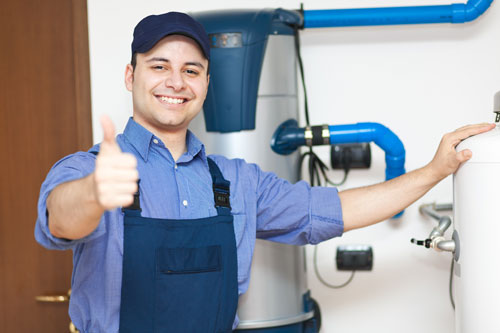The Usual Water Heater Malfunctions
The Usual Water Heater Malfunctions
Blog Article
We've unearthed the article on Common Problems with Tank Water Heaters below on the internet and think it made perfect sense to talk about it with you over here.

Think of starting your day without your regular hot shower. That currently establishes a poor tone for the remainder of your day.
Every house requires a reliable water heater, however just a few understand just how to manage one. One simple method to keep your hot water heater in leading form is to look for faults consistently and also repair them as soon as they show up.
Bear in mind to switch off your hot water heater prior to sniffing around for faults. These are the hot water heater faults you are most likely to encounter.
Water too hot or also chilly
Every water heater has a thermostat that determines how warm the water gets. If the water entering into your residence is too warm regardless of setting a practical maximum temperature level, your thermostat might be faulty.
On the other hand, too cold water may be because of a failed thermostat, a damaged circuit, or improper gas flow. As an example, if you make use of a gas hot water heater with a damaged pilot burner, you would obtain cold water, even if the thermostat remains in perfect condition. For electrical heating systems, a blown fuse might be the offender.
Insufficient hot water
Hot water heater been available in lots of dimensions, depending on your hot water demands. If you lack warm water prior to everyone has had a bath, your water heater is also little for your family size. You need to consider mounting a larger hot water heater storage tank or going with a tankless water heater, which takes up much less space and also is extra durable.
Unusual noises
There are at least five kinds of noises you can speak with a water heater, but one of the most common analysis is that it's time for the water heater to retire.
First off, you ought to know with the normal seems a hot water heater makes. An electric heating unit might sound different from a gas-powered one.
Standing out or banging audios typically indicate there is a piece of sediment in your storage tanks, as well as it's time to cleanse it out. On the other hand, whistling or hissing audios might merely be your valves allowing some pressure off.
Water leaks
Leakages can originate from pipelines, water links, valves, or in the worst-case circumstance, the container itself. With time, water will certainly corrode the storage tank, and discover its escape. If this happens, you require to change your water heater as soon as possible.
Nevertheless, before your change your entire container, be sure that all pipes remain in area which each valve works flawlessly. If you still require help recognizing a leakage, call your plumber.
Rust-colored water
Rust-colored water indicates one of your water heater parts is corroded. Maybe the anode pole, or the storage tank itself. Your plumber will have the ability to recognize which it is.
Warm water
Regardless of exactly how high you set the thermostat, you will not get any kind of warm water out of a heating system well past its prime. A water heater's performance might decrease with time.
You will certainly also get warm water if your pipelines have a cross connection. This indicates that when you switch on a faucet, hot water from the heating unit streams in along with normal, cold water. A cross link is very easy to area. If your warm water taps still follow closing the water heater shutoffs, you have a cross link.
Discoloured Water
Rust is a major root cause of unclean or discoloured water. Rust within the water tank or a stopping working anode rod can cause this discolouration. The anode pole safeguards the tank from rusting on the within and also must be inspected annual. Without a rod or an effectively working anode pole, the warm water promptly rusts inside the storage tank. Contact a specialist hot water heater service technician to identify if replacing the anode rod will repair the trouble; if not, replace your hot water heater.
Final thought
Ideally, your water heater can last ten years prior to you require an adjustment. Nonetheless, after the 10-year mark, you might experience any one of these faults a lot more frequently. Now, you should add a new hot water heater to your spending plan.
How To Troubleshoot 3 Common Water Heater Problems in Twin Cities
The Water Heater Is Leaking
A leaky cold water inlet valve A loose pipe fitting A leaky temperature and pressure relief valve A corroded anode rod A cracked tank Turn Off Your Water Heater:
Shut off your gas water heater by turning the gas valve on the unit to the “OFF” position. Shut off your electric water by switching its power off at your electrical panel. Look for a two-pole breaker labeled “water heater” and turn it to the “OFF” position. Move the ball valve connected to the water heater to be perpendicular to the piping at a 90° angle. Look for the Leak:
Depending on whether the water is coming from the tank's top or bottom, you’ll want to look for the leak in different locations.
If the leak comes from the top of the tank, carefully look for water escaping from the cold water inlet valve or loose pipe fittings. Rusted hot and cold water valves can have loose connections with the tank, with water leaking out of them.
https://mspplumbingheatingair.com/blog/how-to-troubleshoot-3-common-water-heater-problems
We had been brought to that article about Water Heater Repair and Troubleshooting through an associate on another domain. Loved our post? Please share it. Help someone else locate it. We take joy in reading our article about Common Problems with Your Home Water Heater.
Schedule Your Job Now Report this page